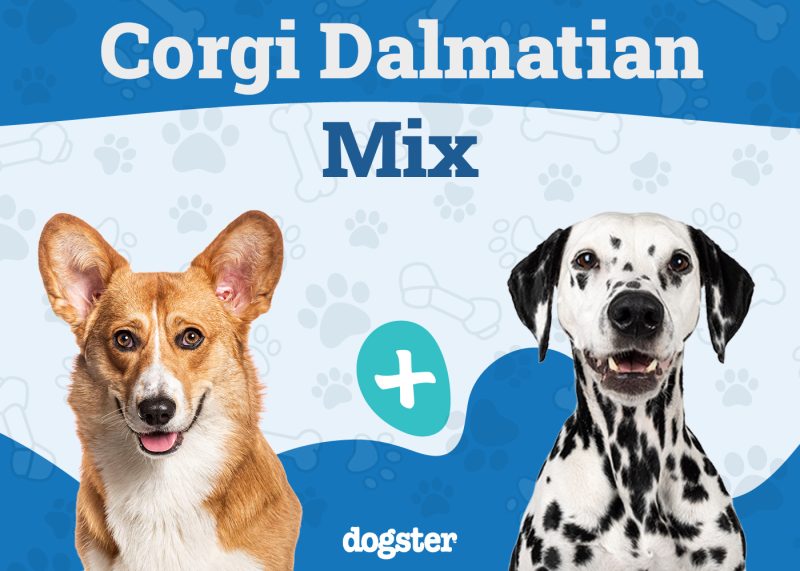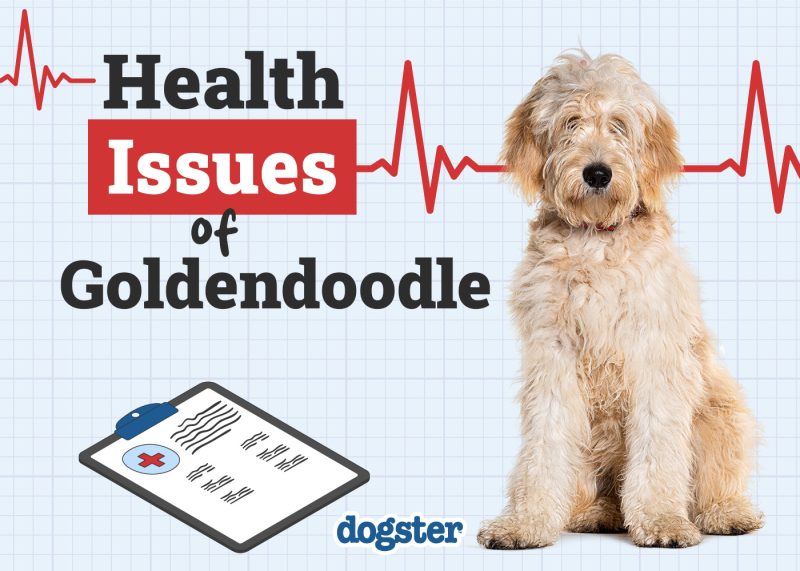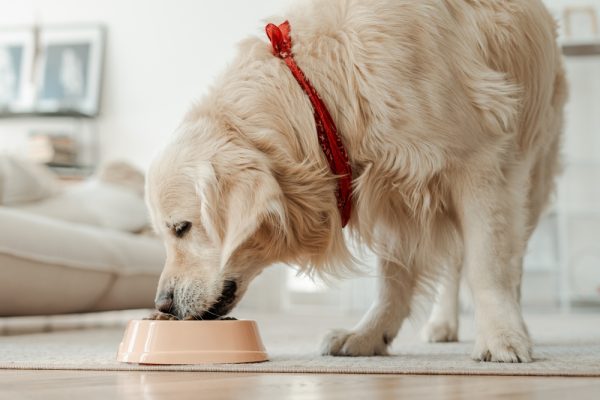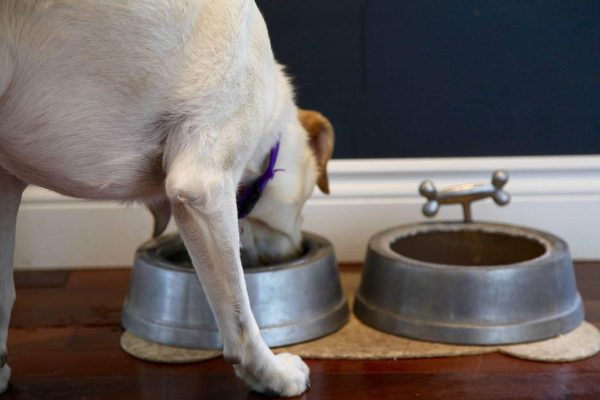Inflammatory bowel disease in dogs is a complex, multifactorial disorder that is caused by inflammation of the walls of the gastrointestinal tract. It can be a debilitating disease that has a significant impact on your dog’s quality of life. It is a chronic condition and if left untreated, can lead to severe weight loss, poor coat condition, and muscle wastage. The first clinical sign reported by owners is usually chronic vomiting and diarrhea in dogs.
This article will discuss in depth everything you need to know about the causes, diagnosis, and treatment of inflammatory bowel disease.

What Is Inflammatory Bowel Disease in Dogs?
Inflammatory bowel disease is a chronic syndrome affecting the digestive tract of dogs. It is made up of a group of conditions caused by the presence of inflammation along the gastrointestinal tract. In the areas of the gut where the inflammation is present, the normal function of the gut is disrupted. This in turn causes a cascade of issues with the digestion of food, absorption of nutrients, and the general health of your dog.
The exact cause of inflammatory bowel disease is not known. There are thought to be several different factors that contribute. Food sensitivities, dysfunction of the immune system, gut bacteria imbalances, and genetics are all believed to be involved. Owners usually report chronic vomiting and diarrhea initially with weight loss and reduced appetite if the problem is long-standing.
What Are the Signs of Inflammatory Bowel Disease in Dogs?
The clinical signs seen with inflammatory bowel disease can be difficult to pinpoint as they can vary massively. They depend on the severity of the disease and the location of the disease in the gastrointestinal tract. Different inflammatory cells can be involved which also affects the clinical signs displayed.
Clinical signs are often non-specific and generalized. Many other problems will also have similar signs so this can make diagnosis tricky. A lot of the clinical signs become relevant when they are being seen repeatedly as this is a chronic issue. Always be sure to tell your vet the frequency and duration of any clinical signs witnessed.
- Chronic vomiting
- Diarrhea sometimes with blood or mucous present
- Lethargy
- Lack of energy
- Abdominal discomfort
- Weight loss
- Poor coat condition
- Loss of appetite
- Muscle wastage
The vomiting and diarrhea can be a chronic persistent problem, or intermittent. It can vary greatly in severity. There may also be spots of blood present in the diarrhea or vomit, but this is usually seen in more severe cases where the inflammation is progressing.

What Are the Causes of Inflammatory Bowel Disease in Dogs?
Inflammatory bowel disease is brought about by the presence of inflammatory changes in the wall of the gut. The causes of this inflammation in dogs are usually triggered by one of a few different things.
Dogs can develop an intolerance to certain food products or ingredients in food. There may be an imbalance of bacteria in their gut. They may also have an exaggerated immune response to the intestinal bacteria. Other causes of intestinal inflammation in dogs include fungal infections, bacterial infections, foreign bodies, allergies, parasites such as Giardia, disruption to the blood supply to the intestines, and cancer.
All of these different things can make the lining of the stomach, the small intestine, the large intestine, and the colon inflamed. As the inflammation gets worse, more clinical signs are seen. The location of the inflammation will dictate which signs are seen. For example, inflammation of the stomach will cause vomiting. Inflammatory changes in the small intestine cause different diarrhea to inflammatory changes in the large intestine.
If you are concerned about the health and well-being of your pet, seek veterinary advice for the best course of action.
If you need to speak with a vet but can't get to one, head over to PangoVet. It's our online service where you can talk to a vet online and get the advice you need for your pet — all at an affordable price!

Diagnosis of Inflammatory Bowel Disease in Dogs
Your vet will start by taking a detailed history and examining your dog from nose to tail. Your vet is likely to perform blood tests and take urine and feces samples for analysis. Imaging such as X-rays and ultrasound may be indicated to assess internal organs. Ultrasound is especially useful for measuring the thickness of the intestine wall.
To diagnose the disease, a biopsy of the affected intestinal wall can be taken. This is done under a general anesthetic. This is not always carried out during diagnostics as it is very invasive, and some dogs may not be fit for a general anesthetic. Often diagnosing inflammatory bowel disease can be a process of elimination, ruling out other common causes of the clinical signs witnessed such as parasites, intestinal blockages, metabolic disorders, or cancers for example.
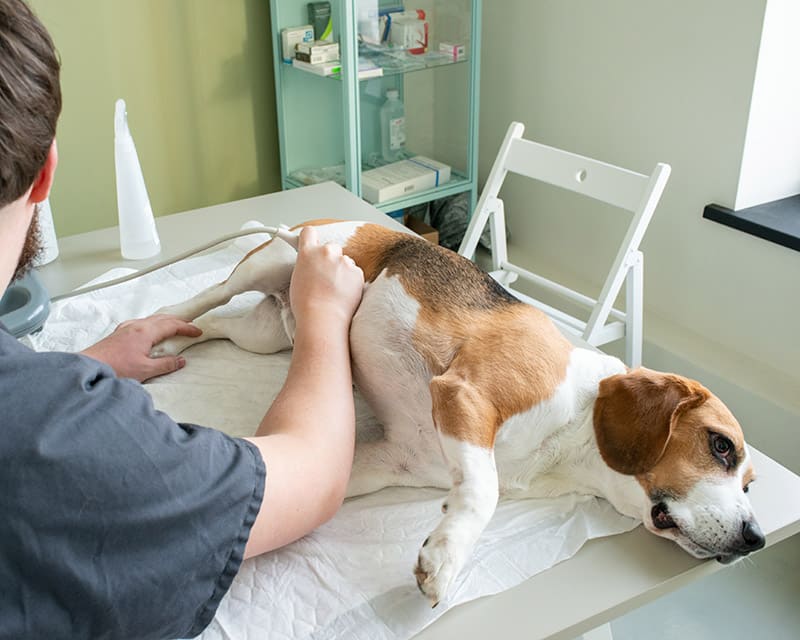
How Do I Care for a Dog With Inflammatory Bowel Disease?
There is no cure for inflammatory bowel disease, however, there are lots of options for management. Management strategies are centered around minimizing the inflammation, eliminating clinical signs, and returning the intestinal bacteria to a normal population size.
The aim is to treat the underlying cause wherever possible (if it has been identified). For example, anti-parasite medication if parasites have been identified or antibiotics if a bacterial infection is present. Sometimes there is no obvious underlying cause, the condition is then named idiopathic inflammatory bowel disease. In many cases, the condition can be managed with a dietary change. Often a diet that contains a novel source of protein which your dog has never been exposed to before can alleviate symptoms. Hydrolyzed protein diets are often recommended too. Hydrolyzed protein sources are when the protein has been broken down into smaller parts so that your dog’s body does not recognize them as protein.
A dietary change needs to be stuck to for a minimum of 8 weeks. Only the specific food can be fed, no extra table scraps or treats can be given. Steroids are frequently used to reduce clinical signs and manage symptoms. Probiotics and prebiotics can be given alongside steroids to attempt to reduce the number of bacteria in the gut and balance out the bacteria population.
Other immunosuppressive medications such as chlorambucil and azathioprine can be used in conjunction with steroids.
Vitamin supplements can be indicated. B12 is often used as dogs with inflammatory bowel disease are unable to absorb this vitamin.
Supportive care is important too, especially when dogs experience a bad flare-up. Vomiting and diarrhea can lead to a high volume of fluid loss in a short space of time. It is not uncommon for dogs to be dehydrated which can be corrected with intravenous fluid therapy. Electrolyte imbalances can also be addressed with fluids. Management of potential stressors can also play a role in alleviating clinical signs.

Frequently Asked Questions (FAQ)
What is the difference between inflammatory bowel disease and irritable bowel syndrome?
Both of those conditions can present with similar clinical signs by causing dogs to have digestive issues. However, they are two separate conditions with different contributing factors and management strategies. Inflammatory bowel disease is caused by chronic inflammatory changes in the gastrointestinal tract. The lining of the intestine is altered by inflammatory cells, and this affects its function. Irritable bowel syndrome is a functional disorder of the muscles in the intestines caused by abnormal movements. There is no inflammation present.
What is the prognosis for a dog with inflammatory bowel disease?
The prognosis depends on the severity of the clinical signs and how long the disease has been present. Some cases respond very well to management and dogs live relatively comfortably for the rest of their lives. Usually, management is done with dietary changes and medication, and a good response is seen. There is a small population of cases that do not respond well to treatment. They will continue to have digestive issues and the long-term effects can be debilitating.
Are dogs with inflammatory bowel disease in pain?
Inflammatory bowel disease can be a very painful disease for dogs. It does not cause direct pain, but the clinical signs often lead to discomfort and suffering. Abdominal cramps from inflamed intestines can cause pain and tenderness.
What breeds are prone to inflammatory bowel disease?
Any breed of dog can develop inflammatory bowel disease, however, certain breeds are more prone to this sort of disease than others. Breeds with a higher risk of developing it include:

Conclusion
Inflammatory bowel disease is a relatively common disease affecting dogs. It can be a debilitating disease but with early diagnosis and initiation of treatment, affected dogs can live long and happy lives. Multiple factors contribute to the development of the disease. This means there are lots of management options. Different things work well for different dogs.
If you think your dog is showing any of the clinical signs of inflammatory bowel disease, speak to your vet as soon as possible.
See also:
- Bowel Obstruction in Dogs: Causes, Prevention & Treatment (Vet Answer)
- Is IBD in Dogs Contagious? Vet-Verified Facts & FAQ
Featured Image Credit: Renko Aleks, Shutterstock


